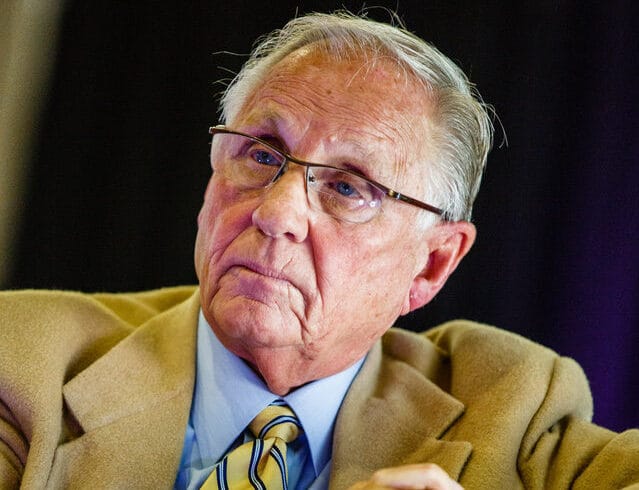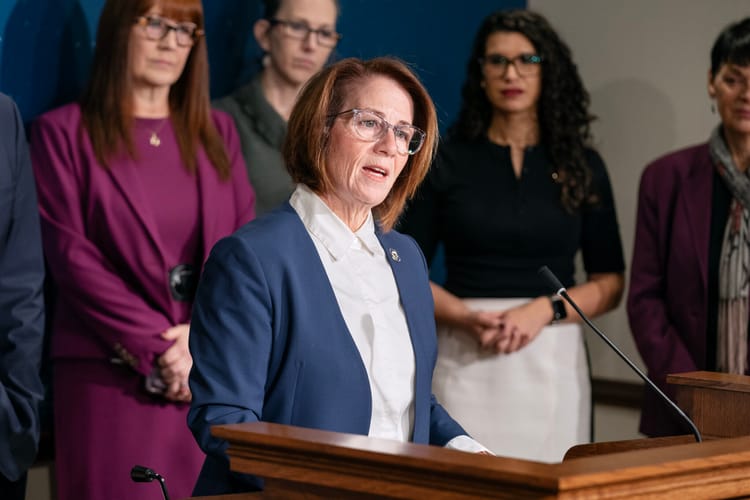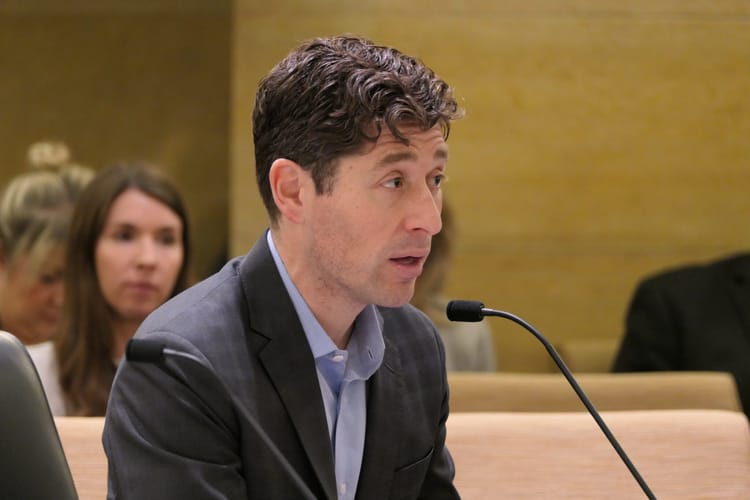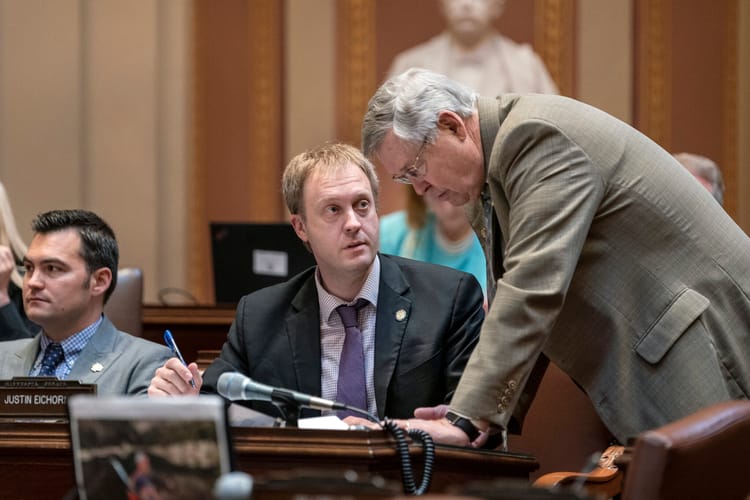Former Gov. Arne Carlson is 88 and battling a massive mining conglomerate

By Colleen Connolly, Minnesota Reformer
Former Gov. Arne Carlson is a political survivor who has long cleared his own path, machete in hand, even when others doubted him. After suffering a resounding defeat in the Republican primary for the 1990 governor’s race, he emerged as a popular write-in candidate.
Jon Grunseth, the GOP nominee facing allegations of sexual misconduct with minors, dropped out nine days before the election. A few days later, the Minnesota Supreme Court ruled that Carlson could be on the ballot as a Republican. In one of the biggest upsets in the history of Minnesota politics, Carlson defeated the incumbent, Rudy Perpich, and went on to serve two terms, ending his time in office in 1999 with a high approval rating.
Now at 88 years old, Carlson, who considers himself an Independent, has refused the typical retiree activities and become a passionate voice in the fight against the PolyMet mine in northeastern Minnesota. Unlike many other PolyMet opponents, however, the fight goes far beyond the environmental threats of sulfide mining. Carlson’s focus is on what he sees as an even more sinister element poisoning Minnesota politics: The growing influence of “monied interests,” i.e. Glencore, the Swiss conglomerate that owns PolyMet.
While PolyMet opponents cheered the U.S. Army Corps of Engineers’ decision this week to revoke a key permit for the mine — a huge setback for the project, but not a death knell — Carlson urges caution.
“This is essentially one battle won, but it’s only one battle in a very large war,” he said. “These foreign conglomerates want to control Minnesota’s waters. The truth is we’ve got to deal first with the corruption in the Legislature.”
For the past five years, Carlson has been talking with environmental groups and learning about how sulfide mining could pollute Minnesota’s water. He’s also been reading up on corporate corruption of Glencore. And, he’s been writing a lot of letters to Gov. Tim Walz and legislators, asking the question, “Why is the state of Minnesota doing business with a company like Glencore?”
The letter-writing campaign has the whiff of Saul Bellow’s Herzog — a quixotic, bewildered, at-times belligerent scream into the ether — but this is a former governor, and it’s Arne, and he has a history of surprising Minnesotans.
Despite his stature — or maybe because of it — Carlson still hasn’t gotten an answer from anyone. He has tried to get a meeting — or even a phone call — with Walz, whom he campaigned for, only to be rebuffed. A few legislators have spoken with him, while others give him the cold shoulder. Undeterred, Carlson keeps going, and going where others will not, such as questioning out loud whether dark money is flowing from Glencore into the political system.
Charles Watenphul, a spokesperson for Glencore, said this allegation is “baseless.”
Chris Knopf, the executive director of Friends of the Boundary Waters Wilderness, has worked with Carlson for years and co-authored reports and op-eds with him. He said Carlson’s political analysis shouldn’t be discounted: “His political instincts are as sharp as they ever were. Just because someone is paranoid doesn’t mean that they’re not right about a conspiracy. He’s really onto something.”
The direct style of the Bronx-born Carlson has been both a breath of fresh air as well as a potential liability to others who have been involved in the fight against PolyMet for much longer and take a more measured approach.
His age and experience also simultaneously help and hurt him. Carlson laments how much things have changed in the Legislature and even in the media, hearkening back to a time when he says it was easier to get an audience with politicians, when elections weren’t awash in money, and when the media was more aggressive in holding elected officials to account. His “in the good old days” critique prompts some eyerolls, while others admire him.
If nothing else, for those fighting against the PolyMet mine, an ally like Carlson has helped boost awareness of both the risks of sulfide mining to Minnesota’s water supply, and the political tentacles of the mine.
Carlson first began looking into the Twin Metals mine about five years ago when a couple of advocates for protecting the Boundary Waters Canoe Area Wilderness asked for his help. They mentioned PolyMet as well, but mostly brushed it off, according to Carlson. The Biden administration eventually imposed a 20-year moratorium on mining in the section of the Superior National Forest where Twin Metals would be, but PolyMet remains on the table.
“I didn’t know anything about this at all — it was very foreign to me,” Carlson said. “But I kept asking questions. What about PolyMet? They kept saying it’s a done deal. Suffice it to say after the meeting I walked home and I was constantly thinking and reflecting and I couldn’t figure out why in the world they were so upset with Twin Metals and not PolyMet. The more questions I asked, the more I realized I’m not getting the straight answers.”

Clean water advocates say PolyMet is just as much of a threat as Twin Metals. Both have the potential to pollute major watersheds and cause irreversible harm to the environment and drinking water. PolyMet, the mine development company under Glencore, says the mine “will be developed in a safe, responsible and respectful manner.” Carlson suspects some political deals were made behind closed doors — and possibly with Glencore — to allow PolyMet to proceed while Twin Metals was thwarted, though there’s no evidence to support the suspicion.
Since then, he’s teamed up with Knopf and two other former legislators — Tom Berkelman and Janet Entzel, both Democrats who served in the 1970s and ‘80s — to start asking questions. Together, they write op-eds, with Carlson’s strong voice being a big advantage, according to Knopf.
“He has a real clarity in seeing true issues, like understanding the importance of water to Minnesota — that water is to Minnesota what energy is to Texas,” he said.
In 2021, along with Duke Skorich, president of Zenith Research Group, they co-wrote a report called “The Future Is Today” on the “subtle yet potent effort to influence public policy in favor of corporate interests.”
They link the change to the U.S. Supreme Court’s Citizens United decision in 2010, which helped to deregulate campaign finance spending, allowing corporations and other groups to spend unlimited amounts of money on elections. They also called out Glencore as “the poster child for international lawlessness” due to its long-documented history of foreign bribery and market manipulation.
Last year, following a U.S. Department of Justice investigation, Glencore pled guilty to violating the Foreign Corrupt Practices Act and engaging in a commodity price manipulation scheme and agreed to pay over $1.1 billion.
“The scope of this criminal bribery scheme is staggering,” U.S. Attorney Damian Williams for the Southern District of New York said after the plea. “Glencore paid bribes to secure oil contracts. Glencore paid bribes to avoid government audits. Glencore bribed judges to make lawsuits disappear. At bottom, Glencore paid bribes to make money — hundreds of millions of dollars. And it did so with the approval, and even encouragement, of its top executives.”
The conglomerate’s history has many — not just Carlson — scratching their heads.
“I’m not saying that (Glencore) bribe public officials yet. Let me be clear on that,” Berkelman said. “But the mere fact that you’re dealing with that kind of an element really should make everybody wonder, why would you do business with them?”
For the most part, legislators ignore Carlson and his team when they send emails asking that same question. Emails sent by the Reformer to the leaders of the four caucuses and Walz also went unanswered or received a “no comment.”
In the meantime, Carlson pushes those legislators who are against PolyMet to call for a hearing on the mine — or even on clean water generally.
One legislator Carlson has spoken with is Sen. Steve Cwodzinski, DFL-Eden Prairie, who has been vocal about PolyMet since his first campaign in 2016. He sponsored the Boundary Waters Permanent Protection Bill, which is now in committee, and says clean water isn’t an issue he’s willing to compromise on. He’s also met with Carlson, who endorsed him when he was running for election.
Carlson appreciates his efforts, but he’s not afraid to push his own allies to fight harder.
“How interesting that with all this ‘strength’ and ‘passion’ for protecting the BWCA, you cannot quite muster the courage to send an email to the governor requesting that he explain why he supports having the state in partnership with Glencore,” Carlson wrote in an email to Cwodzinski on April 2.
Cwodzinski said he has talked to someone in the Walz administration a couple of times about PolyMet, but he acknowledged Carlson’s frustration and said he shares it given the stakes for Minnesota waters.
Carlson’s brash style may turn potential allies away, but others say the situation is too serious to be polite.
“Arne comes on very strong, and I’ve tried to tamp it down a little bit with him sometimes,” Entzel said. “But I think we need a strong force. We need to make people accountable.”
Many environmental groups have also embraced Carlson’s platform. In 2019, Duluth for Clean Water, which advocates against PolyMet and endorses candidates in local elections, invited him to speak about what elected officials can do to stop PolyMet. Board member Bridget Holcomb said she appreciated Carlson’s willingness to speak with them and answer questions after they failed to get a meeting with Walz.
Carlson has also been trying to form a coalition of all the clean water advocacy groups in Minnesota, whether they are related to mining or not, to share information and present a united front. That’s how Jan Mosman, who’s part of a group against a manganese mine in Emily, got in contact with Carlson. Having someone “big and blustery” like Carlson be attached to the pro-water cause, she said, is a great asset.
“I think people aren’t as worried about water because we all think of it as unlimited,” Mosman said. “This coalition idea is to really gather all of the different associations and individuals and agencies that have some concern for water to let our legislators in St. Paul know we’re concerned about this.”
Others, however, have distanced themselves from Carlson. The Minnesota Center for Environmental Advocacy is one of the largest environmental organizations opposed to PolyMet and a leader in filing lawsuits that have held up the project. Aaron Klemz, the organization’s chief strategy officer, said while they support Carlson’s efforts and appreciate the spotlight he’s putting on politics, they consider themselves to be “in a different lane,” focusing on “law and science — and not the politics.”
For Carlson, the politics are what it’s all about. When asked why he’s spending his retirement years so focused on PolyMet, he told the story of having lunch with Harold Stassen, another former governor of Minnesota who became somewhat of a laughingstock for continually running for various offices, including president of the United States, and losing for nearly half a century.
Laughingstock or not, Carlson thinks Stassen is a fine model.
“‘It’s a funny thing,’” Carlson recalled Stassen saying. “‘When people get to 65 or 67 and they retire and go to Florida to play golf, everybody says, ‘Oh isn’t that wonderful? That’s great.’ Stassen said, ‘I retire by playing politics.’ And you know what, he had better ideas than all the other candidates put together. Mentally he was younger than they were and a hell of a lot smarter.”
Minnesota Reformer is part of States Newsroom, a network of news bureaus supported by grants and a coalition of donors as a 501c(3) public charity. Minnesota Reformer maintains editorial independence. Contact Editor Patrick Coolican for questions: info@minnesotareformer.com. Follow Minnesota Reformer on Facebook and Twitter.




Member discussion